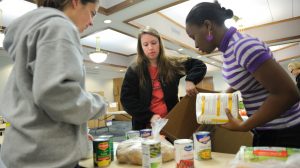
UM students help collect nonperishable foods as part of a campus drive. Getting involved in volunteer activities or events that help others is an excellent way to deal with the stress from a major disaster, mental health experts advise. Photo by Kevin Bain/Ole Miss Communications
OXFORD, Miss. – With 1,409 students from Texas and 513 from Florida enrolled this fall, the University of Mississippi is the home away from home for many residents of the two states that sustained the greatest impact from hurricanes Harvey and Irma.
Many students’ and even some faculty members’ homes and property were damaged or destroyed while they watched the storm’s news coverage and waited to hear from their family members back home.
“(It was) probably the worst week in my life,” said adjunct legal studies professor George Ackerman, who was at his home in Del Ray Beach, Florida, when Hurricane Irma made landfall. “We are perfect today and everyone accounted for here, but it was very bad.
“Ninety degree temperatures in our home, and the baby and kids as well as pets were doing very bad. I slept on the floor, and we jumped staying from house to house as there were no hotels. Finally, we got one after four days. The hurricane itself was frightening to everyone, but we move forward.”
While managing loss of property is often top of mind after a natural disaster, managing the psychological effects of an event of this magnitude can be an even more critical part of storm recovery.
The psychological impact for individuals who are directly impacted by disaster – those who have lost property or a loved one, or who have been injured or dislocated – puts them at risk for developing long-term psychosocial conditions, said Daphne Cain, disaster mental health expert and chair of the UM Department of Social Work.
“Post-disaster reactions and behaviors may appear to be symptoms of psychological distress,” Cain said. However, many of these reactions are normal for people responding to traumatic situations.
“Studies show some common reactions include symptoms of shock, exhaustion, disorientation, irrationality, racing thoughts, fear and anxiety, or uncontrollable emotions,” said Cain, citing a 2013 study by the Substance Abuse and Mental Health Services Administration.
Cain offered five important tips for students affected by the storms:
– Talk about it. Connect with social support systems, including family, friends, teachers and residence hall advisers. Visit the Student Health Center, Psychological Services Center or the Counseling Center.
First-year biology major Maggie Coulter,of Houston, Texas, puts effort into staying connected with her family in the aftermath of Hurricane Harvey.
“I call and check on my parents and grandmother every day,” said Coulter, whose family continues to work on repairing her grandmother’s home, which suffered substantial water damage from the storm.
– Take care and calm yourself. Avoid using alcohol, drugs and tobacco, and engage in healthy coping, including yoga, stretching, walking and deep breathing. Get the rest you need, drink plenty of water for hydration and eat healthy meals and snacks.
– Turn off social media, television and radio. Listening to and viewing coverage of the disaster can be traumatizing or re-traumatizing. Take a break from listening to and viewing coverage.
– Get back to your daily routines. Returning to your normal routine, including going to class, meeting deadlines, engaging with friends and with usual activities, are good ways to regain a sense of control and can help those affected feel less anxious.
– Get involved. You are not alone. Engage in positive activities such as discussion groups and volunteering activities that can help to create a sense of meaning and connectedness. Get involved in university-related volunteer opportunities.
The Department of Social Work’s mission is to prepare competent and ethical social workers, for scientific inquiry and practice, who are leaders committed to social and economic justice, diversity and the enrichment of the quality of life at every level of society. For more information about social work at Ole Miss, email socialwork@olemiss.edu.